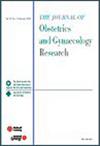Co-mutation of PCLO and SYNE1 defines an immune-activated endometrial cancer subtype with favorable prognosis
Abstract
Background
Endometrial cancer (EC) is a genomically heterogeneous malignancy with diverse immune microenvironment profiles. Although POLE mutations and MSI-H status are established predictors of immunotherapy response, additional composite biomarkers that integrate mutational burden and immune activation are needed. PCLO and SYNE1 are frequently mutated structural genes in EC, yet their cooperative significance remains unknown.
Methods
We analyzed 505 EC cases from The Cancer Genome Atlas (TCGA) and 95 additional samples from the Clinical Proteomic Tumor Analysis Consortium (CPTAC), stratifying tumors based on PCLO and SYNE1 mutation status. Genomic, transcriptomic, immunologic, and clinical features were compared between co-mutation and non-co-mutation groups. Differential expression gene and pathway enrichment were conducted to identify immune-related transcriptional programs. Survival analysis and nomogram were performed to assess prognostic impact.
Results
PCLO and SYNE1 co-mutation defined a notable EC subtype with significant enrichment of POLE mutations, high tumor mutation burden (TMB), reduced aneuploidy, and elevated MSIsensor scores. Clinically, the overall survival (OS), progression-free survival (PFS), and disease-free survival (DFS) of the co-mutation group was significantly improved. Moreover, the co-mutation group exhibited increased infiltration of CD8+ T cells, M1 macrophages, and activated CD4+ memory T cells, as well as upregulation of immune checkpoint genes and chemokine signaling pathways. Finally, a nomogram incorporating co-mutation status outperformed conventional prognosticators and demonstrated high accuracy in survival prediction.
Conclusions
PCLO and SYNE1 co-mutation identifies a biologically distinct EC subset with heightened immunogenicity and superior prognosis. The co-mutation may serve as a robust, integrative biomarker for immune responsiveness and risk stratification in EC.






 求助内容:
求助内容: 应助结果提醒方式:
应助结果提醒方式:


